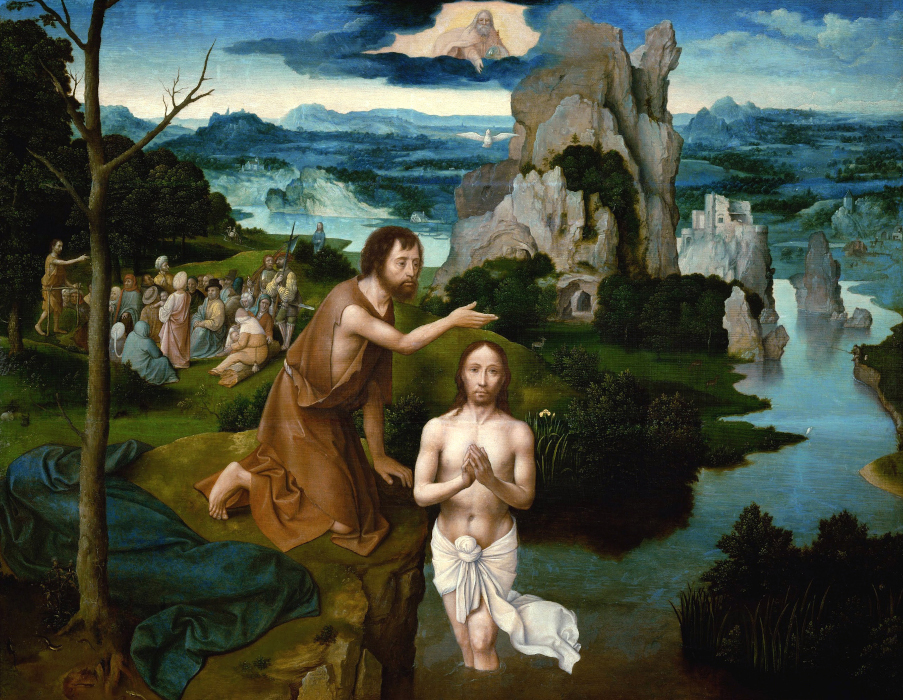
"The Baptism of Christ” by Joachim Patinir, circa 1510. Image courtesy of Kunsthistorisches Museum/Creative Commons
Last Sunday (Jan. 12) most Christian churches celebrated the baptism of Jesus, an event in his life I always found confusing. I could never understand why Jesus was baptized. After all, Catholics believe that Jesus is the Son of God. He is sinless. He never committed any personal sins, and he was not even subject to original sin.
In Matthew’s Gospel (3:13-17), John the Baptist appears to be just as confused as I was. He does not want to baptize Jesus. He says Jesus should baptize him.
So why did Jesus get baptized?
I think the problem John and I had with the baptism of Jesus is that we had a very narrow and deficient view of baptism. When I grew up and memorized my Baltimore Catechism, baptism was described as the sacrament that washed away original sin, the sin we inherit from Adam and Eve. For adults, it also washed away all personal sins.
Likewise, for John, baptism was for the remission of sins.
There is nothing wrong with this description of baptism, as far as it goes, it just does not tell us enough.
If we want to know what the baptism of Jesus and our own baptisms are all about, we need to look to the prophet Isaiah, from whom the Gospel writers borrow in describing Jesus’ baptism.
The baptism of Jesus is all about his commissioning by his Father. In Matthew’s Gospel, after Jesus is baptized, “the heavens were opened for him, and he saw the Spirit of God descending like a dove and coming upon him. And a voice came from the heavens, ‘This is my beloved Son, with whom I am well pleased.’”
The words and actions in the gospel echo those from the Old Testament Book of Isaiah: “Here is my servant…, my chosen one with whom I am well pleased, upon whom I have put my spirit.”
Some early Christians thought that, at his baptism, Jesus for the first time received the Spirit. They also thought that he became the Son of God at this point in his life. It is clear from the infancy narratives that Luke believes that Jesus was the Son of God and united with the Spirit from the moment of his conception.
At the baptism of Jesus, though, God reveals what it means to be the Son of God; the Father gives Jesus a special public mission.
What is the mission that Jesus receives from his Father?
The mission of Jesus is that of the servant described by Isaiah, a favorite prophet of Jesus and the gospel writers. It is a mission of justice and peace.
"He shall bring forth justice to the nations, not crying out, not shouting ... A bruised reed he shall not break, and a smoldering wick he shall not quench.”
That does not sound like partisan politics in America today, where there is a lot of shouting.
This mission of Jesus is also about teaching, healing and liberation. Isaiah says, he is to be "a light to the nations, to open the eyes of the blind, to bring out prisoners from confinement, and from the dungeon those who live in darkness."
The baptism of Jesus also tells us about our own baptism. If Jesus was commissioned at his baptism, so, too, are we. Baptism does not just wash away sin; baptism is not just for our personal salvation.
Baptism commissions us with the Spirit to the same mission that Jesus had. We are to be servants of the Lord working for peace and justice, we are to be prophets preaching the good news of God's love and compassion, and we are to be a healing presence.
The question for Christians is how we continue the mission of Jesus. Any time we are a healing and peaceful presence in our families, our neighborhood, our workplace and politics, we are fulfilling the mission of Jesus. Any time we oppose racism, sexism and homophobia, we are fulfilling the mission of our baptisms.
We continue the mission of Jesus when we work to stop global warming and work for peace in the Middle East, create good jobs for the poor and provide healthcare to the sick, teach children and free those unjustly imprisoned, speak out for justice and protect human rights, witness and profess God’s love to the world.
We are not simply baptized for our personal salvation; we are baptized into the Christian community for service to the world. For to be a Christian is not simply to be saved by Jesus; to be a Christian is also to be Christ active in the world today.
We do not do this mission alone. We do it with Jesus, and we do it in community by the power of the Spirit. If we continue the mission of Jesus, then the Father can say of us, “These are my beloved sons and daughters, with whom I am well pleased.”
[Jesuit Fr. Thomas Reese is a columnist for Religion News Service and author of Inside the Vatican: The Politics and Organization of the Catholic Church.]
Editor's note: You can sign up to receive an email every time a new Signs of the Times column is posted. Sign up here.
Advertisement




